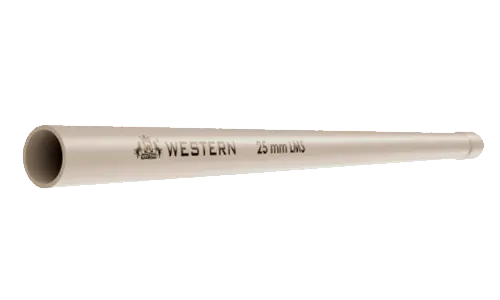Where electrical installations are involved, be it residential, business, or industrial, both security and durability are of top priority. That's where conduit pipes come into the picture. Safety conduits form the foundation of any modern-day electrical system, allowing electric wires to pass through walls, ceilings, and underground in safe and secure ways. Electrical Wires is committed to offering premium conduit solutions that meet stringent security requirements while ensuring long-term performance.
In this blog, we discuss everything you want to know about conduit pipes, including a special focus on uPVC electrical conduits, their features, and why they're an important investment for your next electrical project.
| Nominal Size mm | Outside Diameter mm | Tolerance on Outside Diameter mm | Inside Diameter (Min) mm | ||
|---|---|---|---|---|---|
| Light | Medium | Heavy | |||
| 20 | 20 | -0.3 | 17.4 | 16.9 | 15.8 |
| 25 | 25 | -0.4 | 22.1 | 21.4 | 20.6 |
LMS (LIGHT MECHANICAL STRESS)
| Product Code | Size OD(mm) | Standard Pack |
|---|---|---|
| LMS20 | 20 | 75 X 3m |
| LMS25 | 25 | 50 X 3m |
GST EXTRA AS APPLICABLE

MMS (LIGHT MECHANICAL STRESS)
| Product Code | Size OD(mm) | Standard Pack |
|---|---|---|
| MMS20 | 20 | 75 X 3m |
| MMS25 | 25 | 50 X 3m |
GST EXTRA AS APPLICABLE

HMS (HEAVY MECHANICAL STRESS)
| Product Code | Size OD(mm) | Standard Pack |
|---|---|---|
| HMS20 | 20 | 75 X 3m |
| HMS25 | 25 | 50 X 3m |
GST EXTRA AS APPLICABLE

With a focus on product quality, technical skills, and customer happiness, Electrical Wires is a preferred brand in the category of electrical accessories. Here's why our customers choose us:
On-time Delivery Nationwide
We utilize the most advanced extrusion and injection moulding techniques to fabricate our conduit pipes with uniform wall thickness and smooth texture that fulfil functional and appearance requirements.
Conduit pipes are covered tubes that insulate and channel electrical wires in a systematic manner. They seek to insulate wires from water, bumping, and chemical contact, as well as offer fire-resistant characteristics.
Commonly employed materials for conduit pipes are:
Among these, uPVC conduits are used very extensively in concealed and surface wiring due to their improved electrical insulation, corrosion resistance, and affordability.
Our range of uPVC electric conduits at Electrical Wires is engineered for maximum safety and durability. Here's the reason uPVC pipes are a first choice in electrical applications:
UPVC is a non-conductive material, making it ideal for safely enclosing live wires with no risk of shocking or short-circuiting. This makes uPVC pipes the best solution for residential and commercial hidden wiring.
nuPVC conduit pipes are self-extinguishing, i.e., they won't contribute to combustion. This reduces fire risk, especially in high-density areas like offices or industrial parks.
Unlike metal pipes, uPVC conduits will not rust or corrode, even in chemically aggressive or damp environments. This translates into a longer life for your electrical infrastructure.
UPVC pipes possess a flawless, smooth internal bore, and thus, wire pulling is easy. Little friction is involved, so the installation is faster and the wires are spared from abrasion.
nuPVC is lighter than metal pipes; thus, it is cheaper to transport, cut, and install. This translates into lower labour costs and faster project completion.
Choosing the right conduit pipe is not just about regulations; it's about ensuring long-term electrical protection for people and property. At Electrical Wires, we carry uPVC conduit pipes to the highest standards of safety, which makes them appropriate for every installation.
As a homeowner, electrician, or builder, call our experts to choose the right conduit pipe for your next installation.
Call us today or book a free consultation!